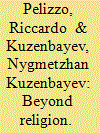|
|
|
Sort Order |
|
|
|
Items / Page
|
|
|
|
|
|
|
| Srl | Item |
| 1 |
ID:
193269


|
|
|
|
|
| Summary/Abstract |
By equating the traditional mindset with traditional beliefs (in magic, ritual, superstitions, etc.), several studies have consistently shown that such beliefs significantly influence people's political behavior and preferences. While these studies have highlighted the political consequences of a traditional mindset in several countries from the Global South, they nevertheless have little to say as to whether holding superstitious beliefs (e.g., believing in fortune tellers, horoscopes, or lucky charms) has certain political implications for countries in the Global North. In this article, we explore whether the traditional mindset has political consequences even in an industrially advanced Germany. We present an analysis of data from the German General Social Survey (GESIS 2019) showing that superstitious voters have less trust in the political system, are more inclined to think that Hitler would be remembered as a good stateman if he had not perpetrated the Holocaust, that the Nazi regime also had a good side, and that the Jews are different and, in any case, have too much influence. Hence, dissemination of superstitious beliefs could make right-wing populists more electorally appealing and successful than they once were. We believe our findings to be of some importance as they show that if the proliferation of superstitious beliefs continues unchecked, they may transform our political systems in ways that policy makers and democratic forces should strive to avoid.
|
|
|
|
|
|
|
|
|
|
|
|
|
|
|
|
| 2 |
ID:
141793


|
|
|
|
|
| Summary/Abstract |
The sinking of the Lusitania sharpened debate in Washington over whether the United States should make the defense of neutral rights a casus belli. The hard line that President Woodrow Wilson adopted regarding German violations of neutral rights caused his secretary of state to resign in protest, with the redlines established in 1915 generating a precarious neutrality that lasted less than two years. This article examines the links between Wilson’s wartime policies, the revisionist literature of the interwar period, and the Neutrality Acts of the mid-1930s. It argues that “history’s lessons” may mislead rather than inform if context is ignored.
|
|
|
|
|
|
|
|
|
|
|
|
|
|
|
|
|
|
|
|
|